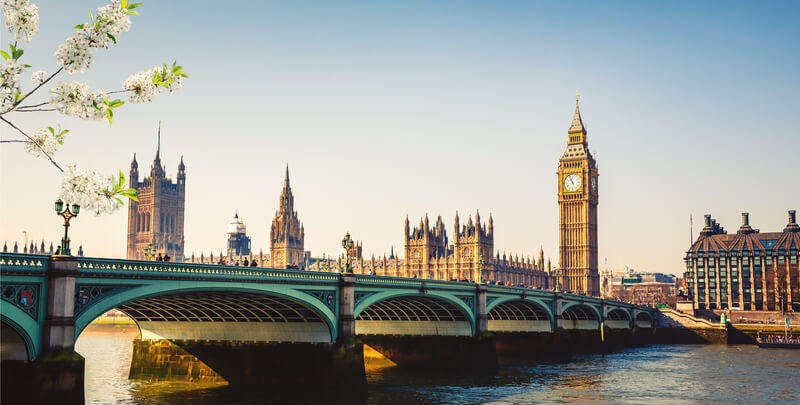How to open a bank account with Heritage Bank. The requirements, account types and fees.
Looking for how to open a bank account with Heritage Bank? We’ve got you covered. Here’s the process, fees and what you need to know.

Every year thousands of Australians head to the UK with most holidaymakers being return visitors.¹ If you’re planning to go there for more than just a quick visit then there are a few logistical things to consider. One is banking.
When spending long periods of time in a foreign country it’s always a good idea to consider whether it is worth getting some local account details. So let’s take a look at what your options are for opening an account in the United Kingdom and if an online alternative like Wise might be simpler.
| 💸 Keep over 40 currencies and get personalised account details for currencies like AUD, EUR, USD, GBP & CAD – Send and receive payments from abroad like a local |
|---|
Learn more about the
Wise Account
There are many different banks in the United Kingdom but like Australia some are more popular than others. Here’s who’s considered the “Big Four” banks in the UK.²
As an Australian you can open a bank account in the United Kingdom, but how easy it is depends on your circumstances and whether or not you’re a UK resident (or plan to become one).
Becoming a resident of the UK, if you intend to stay there for the foreseeable future will highly simplify the process of opening an account there, as you will get the needed documentation traditional banks look for.
You could also turn to more flexible online financial solutions like Wise. The Wise Account provides you local account details in GBP, which can be used to receive and make payments just like a local in the UK.
Start by choosing a bank and account that you meet the eligibility criteria for. Once you’ve done this you can start the application process.
Many UK banks offer customers the option to apply online. Here’s an overview of how that process generally works.
Once your account is approved the bank will send you some form of confirmation and you’ll be able to start using it.
Depending on the bank you may also be able to apply using one of these methods, keeping in mind that the criteria and required documentation should be the same.
| Read more: best GBP accounts in Australia |
|---|
Each UK bank has lists of documents and information that are required to open a certain type of account. In general, you’ll be asked for your personal details, proof of identity and proof of address.
Here’s some of the personal information you could be asked for.
Proving your identity should be relatively straightforward because Australian passports can be accepted.⁴ Alternatively you could provide a UK or EU drivers licence or UK biometric residence permit.
Proof of address can be more tricky, especially if you’re not settled yet, but here’s what might be acceptable.⁴
An important consideration when opening a new bank account is the fees you’ll be charged. To know exactly what you’ll be charged you need to check the relevant fee schedules, but here’s what you could be in for.
In general, UK banks usually don’t charge monthly fees for their everyday current accounts. These accounts usually allow you to send and receive GBP in the UK for free and have low or no fees for sending Euros within the European Economic Area.⁸
You may likely need to do some international transfers and currency conversions. High street bank fees for this type of transaction can get quite expensive, especially since you can be charged multiple ways for a single transaction. Here’s a few things to look out for when you’re reading the fee schedules.
| Read more: best foreign currency accounts in Australia |
|---|
Many UK banks don’t charge for sterling ATM withdrawals or using your debit card for GBP transactions within the United Kingdom.
Where you’ll generally face fees is for making an ATM withdrawal or debit card payment in a foreign currency. To give you an idea, Barclays UK charge a fee of 2.99% for either of these actions.⁸
Overall this means using a UK bank card when travelling to nearby European countries or going back to Australia for a visit is probably not the most cost effective solution.
If you don’t qualify to open a normal UK bank account don’t stress, there are a few alternatives out there.
Some banks offer accounts that cater specifically to international students studying in the UK. These accounts often have modified documentation requirements to make it easier to apply.
One example is the International Student Account with HSBC UK.⁵ If you’re an Australian student living and studying in the UK this is all you have to take to a local HSBC UK branch for proof of identity and address.
If you’re unable to meet the proof of address requirements then one option is to open a non resident or international account. Not all banks offer these and the downside is they can be very expensive.
For example, Barclays offers an International Bank Account which you can open in GBP as a non-UK resident, but you need to hold a minimum of £100,000 (or equivalent) across your Barclays accounts.⁶
Without a UK address the easiest option might be joining an online financial service provider that offers accounts to Australians. Here are some available to Australian residents.
When choosing which service provider is right for you, you’ll want to see who offers the most for you living in the UK. Here’s an idea of what to look for.
If you look online you’ll notice that many Australian banks appear to have a presence in the UK. Unfortunately, according to the Australian High Commission UK these banks don’t offer over the counter banking assistance to visiting Australians.⁷
There are some international banks that have a presence in Australia and the UK, such as HSBC. If you're with one of these banks it’s worth seeing if there’s a way you can open a UK account as an extension of the account you already hold in Australia.
Opening a UK bank account can be a bit of a process that’s made more difficult if you aren’t considered a resident yet. The good news is there’s an easier way to get setup to send and receive GBP, and you can do it before you even leave Australia.
The Wise Account from Wise — while not a bank account — enables you to store over 40 international currencies and get local account details for a number of different countries, including AUD, GBP, NZD, EUR and USD. You can use these to easily transfer your money to Wise or get paid by others..
You’ll also avoid high international transaction fees and get access to the mid-market rate on all conversions. The best part - you can open and manage your Wise account completely online.
Join over 13 million customers currently using Wise.
Register your Wise Account
in minutes
| Please see Terms of Use for your region or visit Wise Fees & Pricing for the most up-to-date pricing and fee information. |
|---|
Sources:
Sources checked on: 3 April 2023
*Please see terms of use and product availability for your region or visit Wise fees and pricing for the most up to date pricing and fee information.
This publication is provided for general information purposes and does not constitute legal, tax or other professional advice from Wise Payments Limited or its subsidiaries and its affiliates, and it is not intended as a substitute for obtaining advice from a financial advisor or any other professional.
We make no representations, warranties or guarantees, whether expressed or implied, that the content in the publication is accurate, complete or up to date.

Looking for how to open a bank account with Heritage Bank? We’ve got you covered. Here’s the process, fees and what you need to know.

Looking for how to open a bank account with ME Bank? We’ve got you covered. Here’s the process, fees and what you need to know.

Planning to move to Australia? Known as the land of sea and sun, Australia offers many great opportunities to new arrivals, although there are of course some...

Looking for how to open a bank account with Suncorp? We’ve got you covered. Here’s the process, fees and what you need to know.

Looking for how to open a bank account with BankSA? We’ve got you covered. Here’s the process, fees and what you need to know.

When looking for the perfect bank account for your money, it’s important to evaluate the options before settling on one. Banks and their bank account...